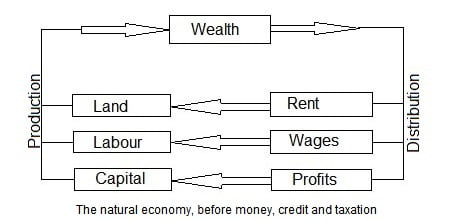SOLVING THE DEPRESSION
Forget technical jargon. That only ties us in knots.
Is nobody doing well?
They are? Who?
The “one percent” are doing exceptionally well at the expense of others?
So, the problem is one of distribution, rather than one of generalised poverty?
How was the distributional flow constricted in such a manner that the 1% could be rewarded out of the earnings of the 99%?
Let’s draw a picture of flows within the economy to see how a fair distribution might have been denied the 99%.
Natural income flows (before taxation) can be seen as: wages to workers; profits to capital; rent to land.
First, let’s remember that in economics land is any natural resource, be it land, sea(fisheries), or air(waves). Rent flows to the “owners” of these natural resources, as it does to other government-granted privileges, such as taxi licences, etc.
But do not those granted ownership, title or licence over natural resources have a duty to pay the rent for them back to society?
Did they create land (the natural resource)? No?
Does paying an ingoing absolve the necessity to pay the rent? No?
By definition, labour earns its wages and capital its profits – yes?
Could the privatisation of public rent (i.e. rent-seeking) explain the knot in the distributional system which favours rentiers as a class as against labour and capital?
Could that default also explain why it has become necessary to introduce taxes on labour and capital for the necessary running of government?
Is it possible to remedy this misdistribution by abolishing taxes on labour and capital and funding necessary government out of government-granted privileges, super-profits, or rents that are not available to everyone else?
No? Why not? What are the obstacles? The rent-seeking 1%?
You say we need more funds to tackle poverty, homelessness, health, the environment, education and infrastructure? I say instituting the Henry Tax Review is a BIG step towards solving those problems.
